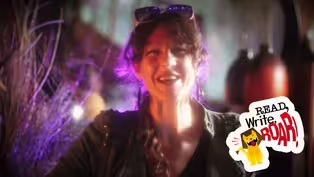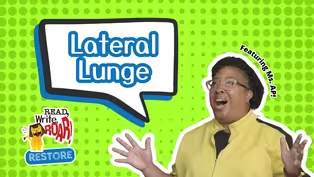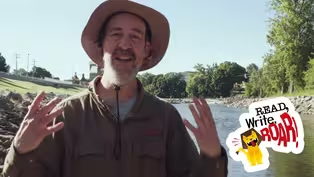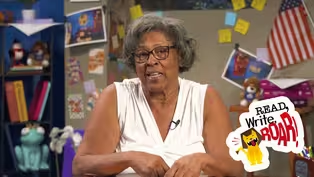Read, Write, ROAR!
Otterly Amazing: Detroit River Tales
Clip: Season 1 Episode 1008 | 6m 39sVideo has Closed Captions
The North American River Otter is making a splash in the Detroit River after 100 years!
Did you know the North American River Otter is making a splash in the Detroit River after 100 years? Join Mr. Peterson and Dr. John Hartig as they explore the otters' return and what it means for the environment. Plus, learn how to write from a first-person point of view in a fun, otter-inspired writing lesson!
Problems playing video? | Closed Captioning Feedback
Problems playing video? | Closed Captioning Feedback
Read, Write, ROAR! is a local public television program presented by Detroit PBS
Read, Write, ROAR!
Otterly Amazing: Detroit River Tales
Clip: Season 1 Episode 1008 | 6m 39sVideo has Closed Captions
Did you know the North American River Otter is making a splash in the Detroit River after 100 years? Join Mr. Peterson and Dr. John Hartig as they explore the otters' return and what it means for the environment. Plus, learn how to write from a first-person point of view in a fun, otter-inspired writing lesson!
Problems playing video? | Closed Captioning Feedback
How to Watch Read, Write, ROAR!
Read, Write, ROAR! is available to stream on pbs.org and the free PBS App, available on iPhone, Apple TV, Android TV, Android smartphones, Amazon Fire TV, Amazon Fire Tablet, Roku, Samsung Smart TV, and Vizio.
Providing Support for PBS.org
Learn Moreabout PBS online sponsorshipdo you know who's Making a Splash in the Detroit River the North American river otter it has been over a hundred years since the river otter lived in and around the Detroit River I wonder what it is like for them to be coming back I know someone who knows a lot about river otter his name is Dr John hardig and he is a scholar at the University of Windsor which is right across the Detroit river in Canada I'm going to call John and talk to him about the North American river otter and why it is such a good sign that it has come back to the Detroit River I'm going to keep some notes while I talk with John because I want to use what he tells me to help with some writing hey John uh can you tell us a little bit about the North American river otters and when and why they left the Detroit River sure Brian you know River roders are amazing animals they are semi aquatic that means they live part of their life on the land and part in the water they have clawed feet that they can grasp slippery prey they have a big protective coat of fur on them to keep warm when they're swimming in cold water they have short Stout legs webbed feet and they have a narrow streamlined body that can help them swim efficiently in the water they were once really common throughout Southeast Michigan and along the Detroit River they were first overh harvested to local Extinction during the fur trade era but then fast forward you get into when Detroit became the industrial Heartland and the automobile capital of the United States a whole bunch of industrial pollutants were discharged and dumped into the river these pollutants especially oil and Petro products would coat the fur of river otter and they couldn't keep warm and would die then if they were here wow so how did the river otter then return to the Detroit River and and why is that so important Brian it's a really fascinating Story down in Ohio on the Eastern Basin of Lake Yuri the Ohio Department of Natural Resources said boy we've got some good quality streams down here and we think we could bring back some river otter so they went down to Arkansas and Louisiana and got some river otter brought them up and they thrived in these streams entering the Eastern Basin of Lake Yuri people like myself biologists on the river uh were thinking oh it's a matter of time before they come up and visit the Detroit River and then a graduate student from the University of Windsor was out taking a walk one one early morning in 2022 and he saw an animal pop its head out and so he went out on a pier right near the embas bridge got his camera out it surfaced again it was in fact a river otter that picture then went viral across North America the first time that a river otter was found in Detroit River in over 100 years it could only survive if it was not polluted if there were no industrial pollutants like oil and petroleum products that would mat their fur so that means the river is cleaner for Otter but also we as humans live in the same ecosystem and we share it with them so if it is cleaner for river otter it's cleaner for you and me also wow that is amazing thank you so much John I took some quick notes while talking with John and I want to use them to help me write a narrative from the point of view of the river otter returning to the Detroit River what a great way to share the news about their return point of view is who is telling the story in this case the river otter will be the narrator telling the story from a firstperson point of view and detailing what they personally experienced when writing in first person you might might use words like I me and my let's take a look at my writing I'm excited to share with you that I'm moving to Detroit for years I've heard about the pollution and the dirty shores of the Detroit River but just the other day while enjoying a fish dinner with a friend they said to me have you heard the water in the Detroit river is clearing up I heard the fish are returning and that the shore is positive and full of life once again after hearing that I decided to take a journey to Detroit and check it out for myself to my surprise my friend was correct the water was clean and full of fish the shores were Lush with plants and the air was easy to breathe so I picked my family up and we set our destination to the clean Waters of the Detroit River I'm excited to fish the river and enjoy future friendships with new neighbors like the beaver family the sturgeon family the bald eagle family and so many more this was written from a river Otter's firstperson point of view which is a powerful way to hear about their return to the Detroit River by writing in first person the river otter helped us experience all of the action and emotions through his eyes if someone other than the river otter told the story that would be a third person point of view we would still hear the story of the river otter but it would be more distant and we wouldn't have been able to get to know the life of the river otter as personally as we did are there river otter where you live they've been spotted in places like manisty and the Upper Peninsula I'm so excited that river otters are back to living in the Detroit River a 100 years is a long time to be gone but from the Otter's point of view I know they're here to stay [Music]
Create a Rock Concert Soundscape | Ms. Audra | Read, Write, ROAR!
Video has Closed Captions
Clip: S1 Ep1008 | 1m 54s | Play your air guitar, bang the drums, and rock out with your own sounds. (1m 54s)
Lateral Lunge | Read, Write, ROAR! Restore
Video has Closed Captions
Clip: S1 Ep1008 | 2m 37s | Start with a warm-up, lunge side to side, and cool down with deep breaths. (2m 37s)
Writing About Reading on the River | Paul Roose | Read, Write, ROAR!
Video has Closed Captions
Clip: S1 Ep1008 | 4m 27s | Learn how reading trail signs can connect us to nature and Michigan’s past. (4m 27s)
Writing a Persuasive Pitch: Lansing River Trail | Mrs. Mask | Read, Write, ROAR!
Video has Closed Captions
Clip: S1 Ep1008 | 5m 27s | Learn about parks and historical sites while creating your own persuasive pitch. (5m 27s)
Providing Support for PBS.org
Learn Moreabout PBS online sponsorship

- Home and How To

Hit the road in a classic car for a tour through Great Britain with two antiques experts.












Support for PBS provided by:
Read, Write, ROAR! is a local public television program presented by Detroit PBS




